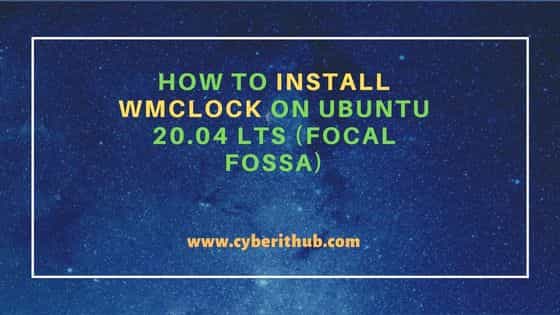Table of Contents
In this article, I will take you through the steps to install wmclock on Ubuntu 20.04 LTS (Focal Fossa). wmclock is a free and open source dockable clock for the Window Maker window manager. It is basically an applet that was designed by Alfredo Kojima to display the date and time in a dockable tile in the same style as the clock from the NEXTSTEP(tm) operating system. It is also quite easy to install in almost all the famous Linux distributions. Here we will see the steps to install wmclock on Ubuntu 20.04 LTS (Focal Fossa).

How to Install wmclock on Ubuntu 20.04 LTS (Focal Fossa)
Also Read: How to Install GCC(C and C++ Compiler) on Ubuntu 20.04 LTS
Step 1: Prerequisites
a) You should have a running Ubuntu 20.04 LTS Server.
b) You should have sudo or root access to run privileged commands.
c) You should have apt or apt-get utility available in your Server.
Step 2: Update Your Server
Before going through the steps to install wmclock, it is wise to first update and upgrade all the installed packages to the latest version from Ubuntu repo by using sudo apt update && sudo apt upgrade command as shown below.
cyberithub@ubuntu:~$ sudo apt update && sudo apt upgrade
[sudo] password for cyberithub:
Hit:1 http://in.archive.ubuntu.com/ubuntu focal InRelease
Get:2 https://dl.google.com/linux/chrome/deb stable InRelease [1,811 B]
Get:3 http://in.archive.ubuntu.com/ubuntu focal-updates InRelease [114 kB]
Get:4 http://security.ubuntu.com/ubuntu focal-security InRelease [114 kB]
Get:5 http://in.archive.ubuntu.com/ubuntu focal-backports InRelease [108 kB]
Get:6 http://in.archive.ubuntu.com/ubuntu focal-updates/main i386 Packages [775 kB]
Get:7 https://dl.google.com/linux/chrome/deb stable/main amd64 Packages [1,075 B]
Get:8 http://security.ubuntu.com/ubuntu focal-security/main amd64 Packages [1,959 kB]
Get:9 http://in.archive.ubuntu.com/ubuntu focal-updates/main amd64 Packages [2,335 kB]
Get:10 http://in.archive.ubuntu.com/ubuntu focal-updates/main amd64 DEP-11 Metadata [274 kB]
Get:11 http://in.archive.ubuntu.com/ubuntu focal-updates/main amd64 c-n-f Metadata [16.2 kB]
Get:12 http://in.archive.ubuntu.com/ubuntu focal-updates/restricted i386 Packages [30.5 kB]
..............................................................
Step 3: Install wmclock
In the next step, you can install wmclock from default Ubuntu repo by using sudo apt install wmclock command as shown below. This will download and install the package along with all its dependencies.
cyberithub@ubuntu:~$ sudo apt install wmclock Reading package lists... Done Building dependency tree Reading state information... Done The following packages were automatically installed and are no longer required: libfwupdplugin1 libllvm11 libxmlb1 Use 'sudo apt autoremove' to remove them. The following NEW packages will be installed: wmclock 0 upgraded, 1 newly installed, 0 to remove and 0 not upgraded. Need to get 28.1 kB of archives. After this operation, 172 kB of additional disk space will be used. Get:1 http://in.archive.ubuntu.com/ubuntu focal/universe amd64 wmclock amd64 1.0.16-1build1 [28.1 kB] Fetched 28.1 kB in 1s (42.6 kB/s) Selecting previously unselected package wmclock. (Reading database ... 196214 files and directories currently installed.) Preparing to unpack .../wmclock_1.0.16-1build1_amd64.deb ... Unpacking wmclock (1.0.16-1build1) ... Setting up wmclock (1.0.16-1build1) ... Processing triggers for man-db (2.9.1-1) ...
Step 4: Verify Installation
After successful installation, you can verify the installed files path by using dpkg -L wmclock command as shown below.
cyberithub@ubuntu:~$ dpkg -L wmclock
/.
/usr
/usr/bin
/usr/bin/wmclock
/usr/share
/usr/share/doc
/usr/share/doc/wmclock
/usr/share/doc/wmclock/README.gz
/usr/share/doc/wmclock/changelog.Debian.gz
/usr/share/doc/wmclock/copyright
/usr/share/man
/usr/share/man/man1
/usr/share/man/man1/wmclock.1.gz
/usr/share/menu
/usr/share/menu/wmclock
/usr/share/wmclock
..........................................
Step 5: Check Version
You can also check the current installed version of wmclock by using wmclock --version command as shown below.
cyberithub@ubuntu:~$ wmclock --version wmclock version 1.0.16
Step 6: Launch wmclock
To launch wmclock, you need to go to Desktop and click on Activities. Type terminal in the search bar to open terminal in the system. Then use wmclock command on the terminal to open the clock as shown below.

Step 7: Check all the Available Options
You can check all the options available with wmclock command using wmclock --help command as shown below. More on Man page.
cyberithub@ubuntu:~$ wmclock --help
Usage: wmclock [option [option ...]]
Options:
-12 show 12-hour time (am/pm)
-24 show 24-hour time
-year show year instead of time
-noblink don't blink
-interval <seconds> set blink interval
-exe <command> start <command> on mouse click
-led <color> use <color> as color of led
-monthxpm <filename> get month names from pixmap in <filename>
-weekdayxpm <filename> get weekday names from pixmap in <filename>
-version display the version
Step 8: Uninstall wmclock
Once you are done using wmclock, you can choose to uninstall it from your System by using sudo apt remove wmclock command as shown below.
cyberithub@ubuntu:~$ sudo apt remove wmclock [sudo] password for cyberithub: Reading package lists... Done Building dependency tree Reading state information... Done The following packages were automatically installed and are no longer required: libfwupdplugin1 libllvm11 libxmlb1 Use 'sudo apt autoremove' to remove them. The following packages will be REMOVED: wmclock 0 upgraded, 0 newly installed, 1 to remove and 0 not upgraded. After this operation, 172 kB disk space will be freed. Do you want to continue? [Y/n] Y (Reading database ... 196282 files and directories currently installed.) Removing wmclock (1.0.16-1build1) ... Processing triggers for man-db (2.9.1-1) ...
